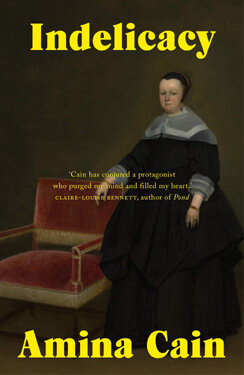There have been many novels about writers grappling with the process of writing. So much so that it's almost become an eye-rolling cliché and could be considered the ultimate form of navel-gazing. But Amina Cain's “Indelicacy” does something very different with this well trodden subject matter. It's a retrospective tale narrated by Vitória who worked as a cleaner in a museum before marrying a wealthy man. Throughout her life she's been driven by a passionate desire to write. The form of her writing changes over time. She jots down striking observations and interpretations about the paintings she sees in the museum and many of these are reproduced in the text of Cain's novel. In doing so, this story builds to a fascinating meditation about the creative process and the way the imagination interacts with our subjective reality. It also shows how the impulse to create can be a motivation that both sustains and debilitates us as it can supersede every other form of human desire. This novel is also a fascinating character study of an abrasive personality who sometimes struggles or fails to connect with women and men in enticingly dramatic ways.
The time and place of the story is never specified which gives the narrator's tale a kind of timeless quality. It also allows a more concentrated focus on her inner life and thought process as larger societal issues aren't involved. Yet this novel does also say something striking about class and privilege. Becoming financially secure through her marriage gives her more time and freedom to write, but it also creates new anxieties and problems for the narrator. Her connections with other women also provides an interesting contrast to her own experiences. Antoinette, a fellow cleaner at the museum, was a good friend of hers and driven by materialistic daydreams. But in her new marriage Vitória breaks their connection and they are estranged for a long time afterwards. As the lady of the house, Vitória tries to become friends with her maid Solange, but Solange rebuffs any form of intimacy which frustrates and dismays the narrator. Vitória also forms a friendship with a dancer who becomes very successful and seems to fully realise her artistic ambitions in a way which persistently eludes the narrator.
The novel forms an interesting extension to Woolf's assertion that a female writer needs a room of one's own. Vitória arranges her entire life in a way which makes space for her ability to write just as she endearingly describes her desire for a quiet space to read without interruption from her noisy family in her early life: “When I tried to read, I was always interrupted, so I had to do it where my family couldn't find me. Under a tree that took me thirty minutes to walk to.” She seems to believe that once she has attained the freedom and space to write the great work she's always felt was within her will fully emerge. So it's almost ironic that once she has finally attained this her most sustained piece of writing is about the long process of getting to this point.
It's also funny how she feels no connection with the literary community that surrounds her. At one point she attends a public interview with an author whose books she likes and finds the experience so disappointing that she bluntly insults the author and interviewer calling them “worms... of the worst kind. When you open your mouths, you are male worms eating from a toilet.” Vitória is so forthright and vociferous about what she's feeling she succeeds in alienating herself from almost everyone around her. Yet her response is also a reaction to the male gaze which she has always been hounded by and she's aware of the assumptions men make about her. So her solitude and rejection of men has a pointed reason. It's interesting to consider if this kind of isolation is necessary for the writer's creative process or if this is just symptomatic of an antisocial personality type. Whatever its meaning, this fascinatingly sharp-toothed novel gives a lot to ponder.









